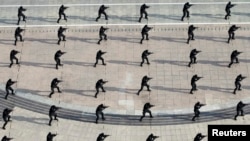As U.S. airstrikes began hitting targets of the Islamic State terrorist group in Syria, China says it supports international efforts to crack down on terrorism. Increasingly though, Beijing is seeing the fight against the Islamic State militants (IS) as an extension of its own efforts at home to battle what it says are religious extremists in its restive region of Xinjiang.
China is unlikely to give the United States and those who have joined an international coalition to fight IS military support any time soon. What Beijing does believe, though, is the fight against the terrorist group dovetails with its own efforts to deal with growing unrest at home.
"China has repeatedly made its stern opposition to terrorism clear, in all of its shapes and forms," reiterated Chinese Foreign Ministry spokeswoman Hua Chunying, adding that "the international community should work together to fight terrorism, including giving support to relevant countries as they make efforts to maintain domestic security and stability."
Much like efforts to fight terrorism elsewhere, China's domestic battle against what it says are violent religious extremists is a source of controversy. Attacks over the past year in China - mostly in Xinjiang - have increasingly targeted innocent civilians. However, the root causes of the incidents are hotly contested and the government severely limits any access to information about what happened.
Overseas Uighur groups say the government's repressive religious and cultural policies in Xinjiang are fueling tensions. Inside China, those who question government policies in Xinjiang are silenced, sometimes in court.
On Tuesday, the Chinese government sentenced Uighur scholar Ilham Tohti to life in prison on separatism charges. The scholar had long been seen as someone who tried to bridge China's ethnic divide between its Han majority and Xinjiang's Uighur Muslim minority group. The United States, European Union, the United Nations as well as human rights groups have called for his release.
The Tohti court ruling, and heavy-handed policies against Uighurs in Xinjiang are expected to make it even more difficult for China to win over international support for its fight at home.
Scale of support
There is also a debate in China about how much support Beijing should provide to the international effort against the Islamic State militants, given China's global stature and oil interests in Syria and Iraq. Military analyst Zhao Chu argued in a blog that joining the coalition could not only give China valuable military experience, but allow it to look after its own interests while showing concern for international justice.
Most state-media commentaries, however, have cautioned Beijing against joining the international coalition, characterizing the effort as just another bid to follow the United States' lead in global affairs. However, as Peking University political scientist Wang Lian points out, the fight against terrorism is no longer an effort that involves a sole struggle within one individual country.
Wang says that "from the moment when the September 11th attacks were launched over 13 years ago, the world has come to understand that international cooperation is needed to fight terrorism." He says such cooperation to fight extremism and terrorism requires a "broader range of authorization and adherence to international laws and justice."
Chinese fighting with IS
Much like other countries across the globe, China is also trying to determine how many Chinese nationals may have joined the Islamic State forces overseas. The Iraqi Army says it captured an Islamic State fighter who is a Chinese national. And Wu Sike, who until recently was Beijing's special envoy to the Middle East, says there could be as many as 100 Chinese nationals participating there.
On Monday, the Communist Party-owned Global Times made a direct link between the Islamic State and what it called extremists in Xinjiang. The report said radicals from Xinjiang are being trained in Iraq, Syria and other parts of Asia. Just days before it highlighted the alleged link, a report in the newspaper also cautioned the international community and media not to jump to any conclusions about the Islamic State.
In a report that highlighted China's need to take a prudent approach to airstrikes on IS, the newspaper argued that little is still know about what it called "the real face of the IS [Islamic State]." The report went on to say that while "Western media outlets have given full coverage to the groups cruelty and extremism," various sources have noted that the group "provides water and electricity in its occupation areas" as well as managing "bakeries, banks, schools, courts and mosques."
The Global Times conclusion was that it is still unclear whether the Islamic State is a terrorist group or a product of Middle East politics.




